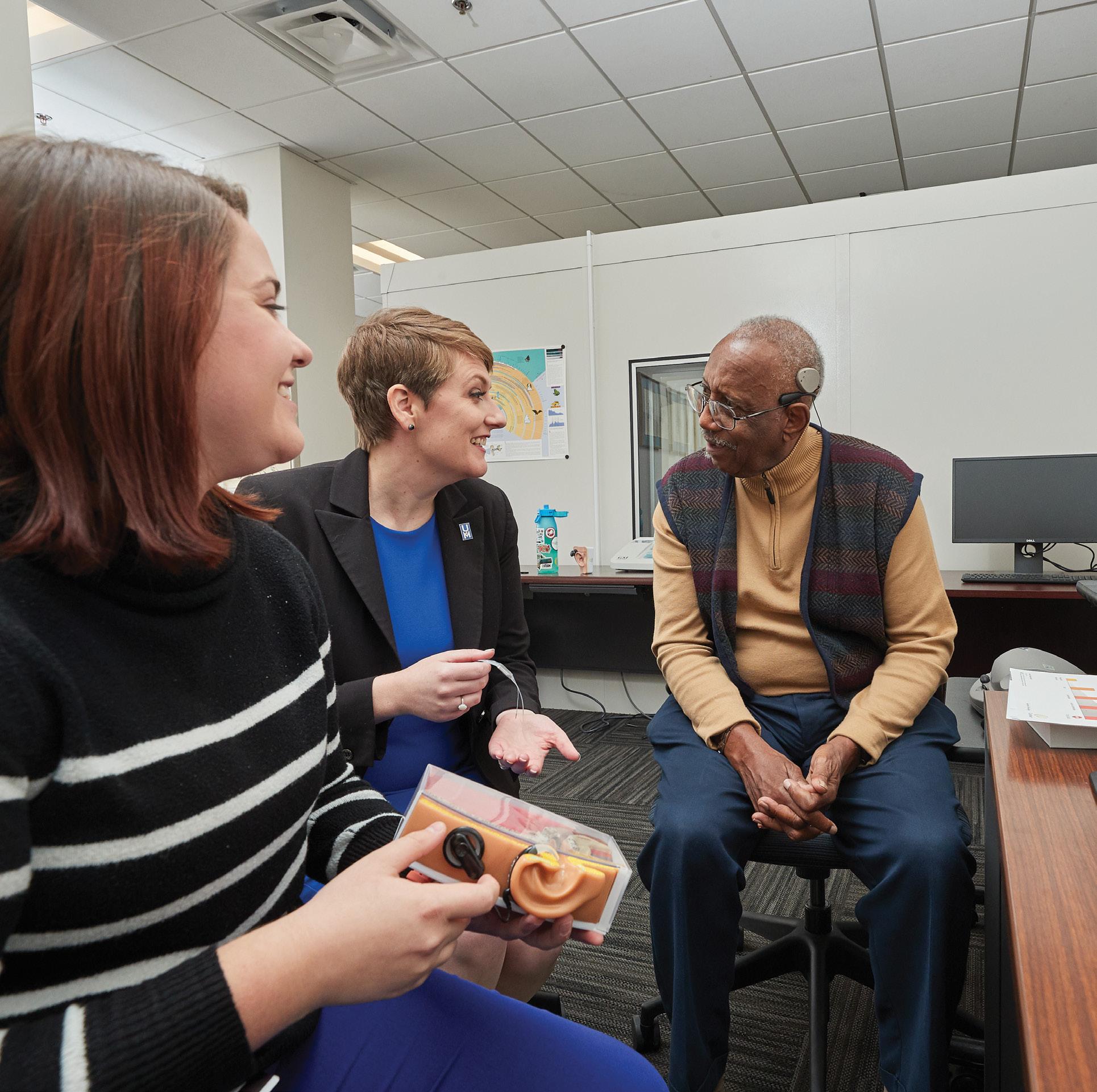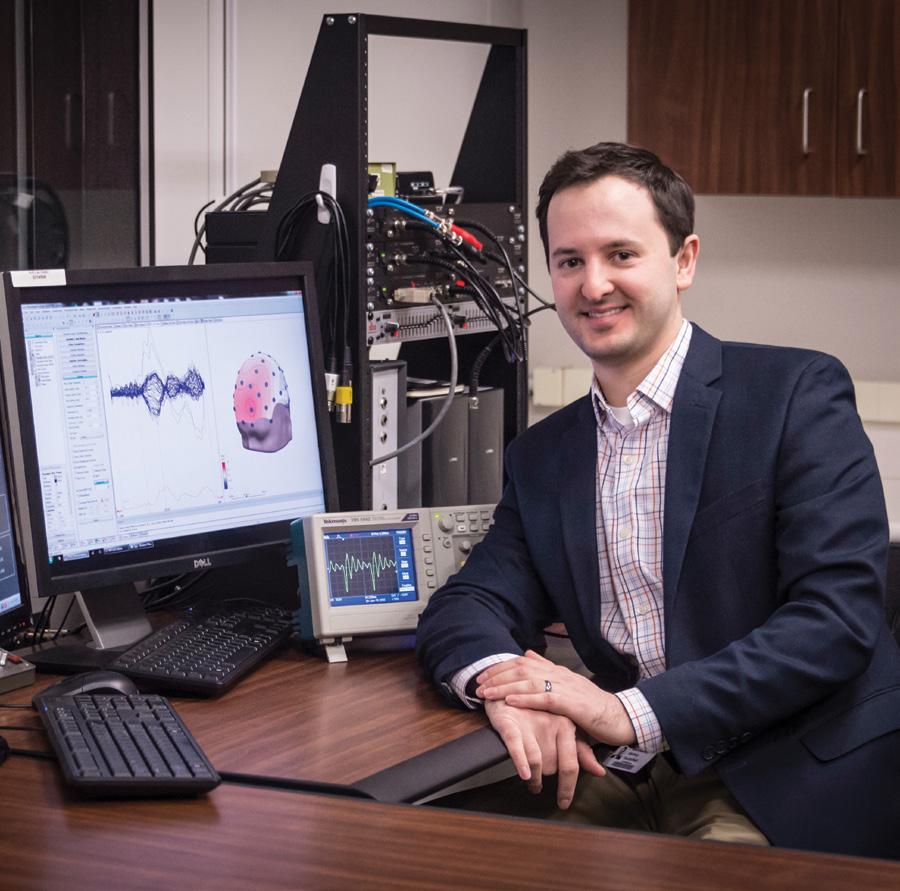
3 minute read
Language Acquisition/ Bilingualism Laboratories
LANGUAGE Language Acquisition Laboratory/ Bilingualism Laboratory RESEARCH
Linda D. Jarmulowicz, PhD is associate professor and interim dean of the School of Communication Sciences and Disorders. She joined the faculty in 2001, after receiving her PhD in Speech and Hearing Sciences from the City University of New York in 2000. Prior to that, she earned an MA in Speech-Language Pathology from Lehman College in 1997 and has an undergraduate degree in Linguistics and Psychology from the University of Massachusetts in Amherst. She is a member of ASHA special interest groups 1, 10 and 14 (Language Learning and Education, Issues in Higher Education and Cultural and Linguistic Diversity), the Linguistics Society of America (LSA), the Society for the Scientific Study of Reading (SSSR), and the International Dyslexia Association (IDA). She has been on the editorial board of reviewers for Language Speech and Hearing Services in Schools, and has reviewed for numerous journals. Dr. Jarmulowicz currently directs the Language Acquisition Laboratory and co-directs the Bilingualism Laboratory with Dr. Kim Oller.
Research Interests Dr. Jarmulowicz directs the Language Acquisition & Analysis Laboratory, where she conducts research in the areas of lexical organization, derivational morphology,
linguistic rhythm, literacy and bilingualism. She is interested in language processing in all its forms, and is particularly interested in the intersections of different areas of language development, such as phonology and morphology, and the influence of language on literacy development. From 2005 to 2011, Dr. Jarmulowicz co-directed an NIH-funded project Bilingual Phonology and Literacy (co-PIs: D.K. Oller, and E.H. Buder) which collected longitudinal data on over 300 children. From 2010-15, she directed a personnel preparation grant supported by the U.S. Department of Education to train and support speechlanguage pathology and audiology
students to work with interpreters to provide culturally and linguistically appropriate services to non-English speaking children and their families.
Current Research and Applications Dr. Jarmulowicz focuses on two primary branches of research — prosody and literacy and the language/development of young English learners. In the area of prosody and literacy, she is particularly interested in the morphophonology of derived words and how production of

polysyllabic and multimorphemic words can reflect lexical representation and organization. Dr. Jarmulowicz has fostered strong collaborations with D. Kimbrough Oller on projects tracking both monolingual and bilingual children in the Memphis area to study their phonological development in a second language as they also learn how to read in English. Current projects examine hesitation phenomena in spoken word productions as a reflection of lexical representation, spelling errors made by English-learning children as a measure of their phonological development, eye tracking studies that examine reading behavior in adults with
Down Syndrome, and exploring relationships between vocabulary, phonological and prosodic development.
Future Endeavors Dr. Jarmulowicz intends to keep her toe in research as much as time permits. Her work trying to understand language and literacy continues. There is likely another personnel training grant in her future.
Student Involvement Dr. Jarmulowicz has mentored five students through their PhD degree, co-mentored three others and served on numerous PhD committees. Her lab provides a variety of opportunities for student involvement at many levels of the research process. Dr. Jarmulowicz encourages students to be part of the products of research, as demonstrated by the many master’s level students who have presented or co-presented posters at regional and national conferences.
Publication Spotlight 1. Chung, W.-L., Jarmulowicz, L. &
Bidelman, G. M. (2017). Auditory processing, linguistic prosody awareness, and word reading in Mandarin-speaking children learning English. Reading and
Writing, 30, 1407–1429. 2. Jarmulowicz, L. (2016). Stress production in derived English words as a developmental window. In J. Thomson & L. Jarmulowicz (Eds.) Linguistic Rhythm and Literacy. John Benjamins/TiLAR. 3. Jarmulowicz, L. & Taran, V. L. (2013).
Lexical morphology: Structure, process, and development.
Topics in Language Disorders. 4. Jarmulowicz, L., Taran, V. L. & Seek, J. (2012). Metalinguistics, stress accuracy, and word reading: Does dialect matter? Language Speech and Hearing
Services in Schools, 43, 410-423. 5. Jarmulowicz, L., Hay, S. E., Taran, V.
L. & Ethington, C. A. (2008). Fitting English derived word production into a developmental model of reading. Reading and Writing, 21(3), 275-297.










